
The Simpsons: Road Rage is a 2001 video game based on the animated television series The Simpsons, and is part of a series of games based on the show. It was released for PlayStation 2, Xbox and GameCube. A Game Boy Advance version was released in 2003.

All Star Baseball 2003 is a baseball video game published by Acclaim Entertainment in 2002. The game features Derek Jeter on the cover.

Tetris Worlds is a version of the video game Tetris. Originally released in 2001 for Microsoft Windows and Game Boy Advance, it was later released for Xbox, GameCube, and PlayStation 2 in 2002. In 2003, an Xbox Live version titled "Tetris Worlds Online" and a single-disc compilation version were released for the Xbox. The latter was bundled with Xbox systems.
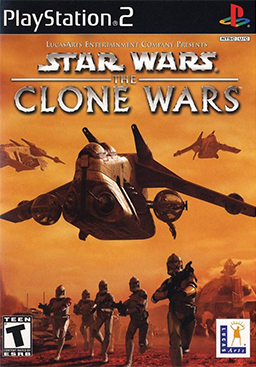
Star Wars: The Clone Wars is a video game set in the Star Wars universe developed by Pandemic Studios and published by LucasArts for GameCube, PlayStation 2 and Xbox. It consists mostly of vehicular combat using clone warships, starfighters, speeder bikes and tanks, as well as missions where players can control Anakin Skywalker, Obi-Wan Kenobi, or Mace Windu on foot. The game is set in the Star Wars prequel trilogy era, with the first level encompassing the Battle for Geonosis from Episode II: Attack of the Clones. The game also features multiplayer modes for up to four players in splitscreen, or online via Xbox Live for the Xbox. It holds aggregate scores of 73 out of 100, 72 out of 100 and 71 out of 100 on review aggregator Metacritic for the GameCube, PlayStation 2, and Xbox, respectively.

NBA Street is a basketball video game developed by NuFX and EA Canada. It was released in 2001 by EA Sports BIG for the PlayStation 2 and in 2002 for the GameCube. It combines the talent and big names of the National Basketball Association with the attitude and atmosphere of streetball. NBA Street is the first game in the NBA Street series and was followed by NBA Street Vol. 2, NBA Street V3, and NBA Street Homecourt.

Madden NFL 2003 is an American football simulation video game based on the NFL that was developed by EA Tiburon and Budcat Creations and published by EA Sports. The 14th installment of the Madden NFL series, the game features former St. Louis Rams running back Marshall Faulk on the cover. This edition of Madden was the first to have EA Trax, the Mini Camp mode, and to feature Al Michaels as play-by-play announcer, who took over for Pat Summerall. Although it featured the expansion Houston Texans and the relocation of the Seattle Seahawks to the NFC, it was actually the second to do so. The game was released on August 12, 2002 for the Game Boy Advance, GameCube, Microsoft Windows, PlayStation, PlayStation 2 and Xbox. The PlayStation version also includes the Sega Genesis version of John Madden Football 93.
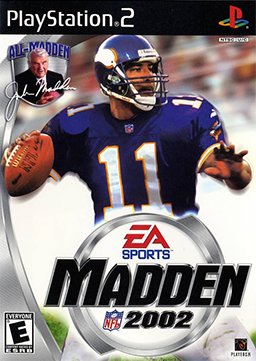
Madden NFL 2002 is an American football video game. It features former Minnesota Vikings quarterback Daunte Culpepper on the cover. Pat Summerall and John Madden are the commentators. The Madden NFL 2002 commercial first aired during Super Bowl XXXVI, three days after Madden NFL 2002 started selling in Japan. Notably, it does not feature the Super Bowl MVP Tom Brady, who is included on later editions of the game as a roster update. It is also the first game to be developed by Budcat Creations.

NBA Live 2003 is the 2002 installment of the NBA Live video games series. The cover features Jason Kidd as a member of the New Jersey Nets. The game was developed by EA Canada and released on October 8, 2002 for the PlayStation, PlayStation 2, Xbox, and GameCube consoles and November 14, 2002 for Microsoft Windows. It was the last NBA Live game to be released on the original PlayStation. The game includes a soundtrack, which is the first video game soundtrack in history to be certified Platinum by the RIAA, selling over 1,300,000 copies worldwide.
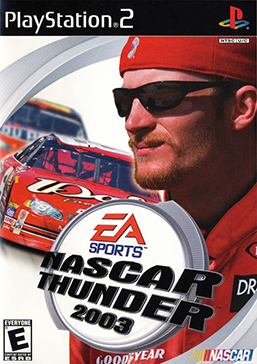
NASCAR Thunder 2003 is the sixth edition of the EA Sports' NASCAR racing simulator series. Developed by EA Tiburon and Budcat Creations and published by EA Sports. It was released for PlayStation, PlayStation 2, GameCube, and Xbox on September 19, 2002, and for Microsoft Windows on October 16. The product features Dale Earnhardt Jr. on the cover. It was the first time the NASCAR's Most Popular Driver Award recipient was featured on the cover, although he did not win the award for the first time until the following year. Dale Earnhardt appeared in the game as a driver as a result of entering his name as a Create-A-Car driver's name; he did not appear in the previous game due to his death. He appeared as a legend in subsequent games.

Beach Spikers is a beach volleyball video game released in Japanese arcades in 2001. The game was developed in-house by Sega AM2 and published by Sega. A GameCube port, renamed Beach Spikers: Virtua Beach Volleyball, was released in 2002 for all regions.

NFL 2K3 is an American football video game released in 2002 for PlayStation 2, Xbox, and GameCube. It was developed by Visual Concepts and published by Sega. It is the only NFL 2K game for the GameCube. The cover athlete features Brian Urlacher of the Chicago Bears, becoming the first cover athlete in the NFL 2K series besides Randy Moss.

ESPN MLS ExtraTime is a sports video game released in 2001-2002 by Konami. It is available for PlayStation 2, Xbox, and GameCube. Clint Mathis is on the cover. The original ExtraTime was released for PS2 seven months after ESPN MLS GameNight on the PlayStation, with the GameCube and Xbox versions released in 2002 afterward as ESPN MLS ExtraTime 2002. MLS ExtraTime was the last in the series as the MLS sold its video game license to EA Sports' FIFA series.

MLB Slugfest 2003 is a baseball video game published by Midway Sports in 2002. It is the first game in the MLB Slugfest series. Alex Rodriguez from the Texas Rangers is the cover athlete.
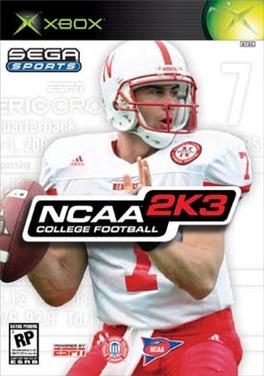
NCAA College Football 2K3 is a 2002 American football video game published by Sega. The cover athlete is former Nebraska Cornhuskers quarterback Eric Crouch. It is the second college football game by Visual Concepts and Avalanche Software.

NCAA Football 2003 is a video game of the sports genre released in 2002 by EA Tiburon. Its cover athlete is former Oregon Ducks quarterback Joey Harrington.
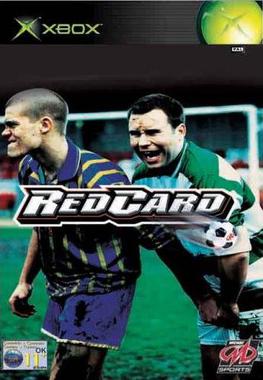
RedCard 2003, known as RedCard in Europe, is a video game based on association football, released in 2002 by Point of View. The game follows most of the rules of football, but allows for heavy tackles and special moves once the player has charged up a special meter.
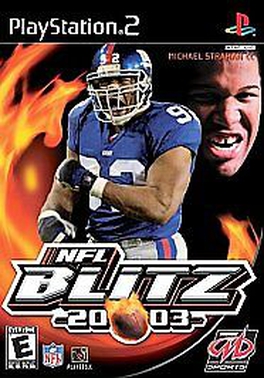
NFL Blitz 2003 is a video game published by Midway Sports for Game Boy Advance, GameCube, PlayStation 2 and Xbox in 2002.

FIFA Football 2003, known as FIFA Soccer 2003 in North America, and simply FIFA 2003 is a football simulation video game produced by Electronic Arts and released by EA Sports. It was released in 2002.
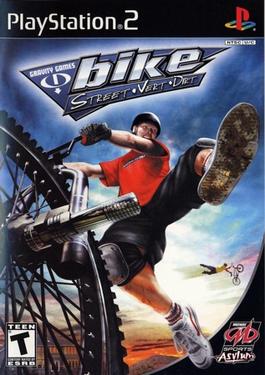
Gravity Games Bike: Street Vert Dirt is a sports video game developed and published by Midway for the PlayStation 2 and Xbox. It was released in North America on June 28, 2002 for the PlayStation 2 and on September 4, 2002 for the Xbox. It was the only game released under the Gravity Games license by Midway.

NBA 2K2 is a 2001 sports video game developed by Visual Concepts and published by Sega for Dreamcast, PlayStation 2, Xbox and GameCube. NBA 2K2 featured more street courts such as Mosswood, Fonde Rec Center, Venice Beach, etc. The cover athlete is Allen Iverson of the Philadelphia 76ers.




















